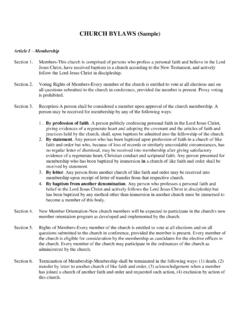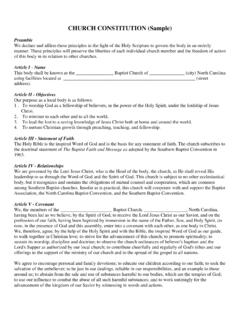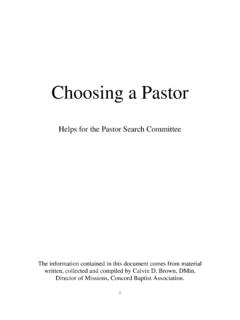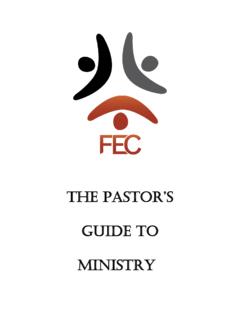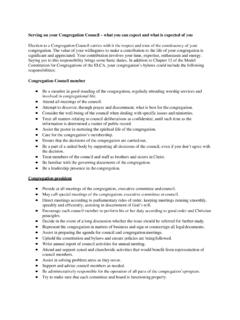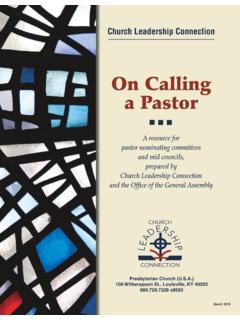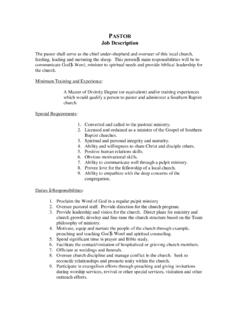Transcription of Finding a New Pastor - Baptist State Convention of North ...
1 Finding a New Pastor for Your Church A unique, step-by-step approach for identifying the right candidate and developing a mutually healthy church- Pastor relationship. By: M. Wayne Oakes Baptist State Convention of North Carolina Milton A. Hollifield, Jr., Executive Director- Treasurer 205 Convention Drive Cary, NC 27511 (919) 467-5100 (800) 395-5102 The missions and ministries of the Baptist State Convention of North Carolina are made possible by your gifts through the Cooperative Program and the North Carolina Missions Offering. BBaappttiisstt SSttaattee CCoonnvveennttiioonn ooff NNoorrtthh CCaarroolliinnaa 11 Finding a New Pastor for Your Church By: M. Wayne Oakes Office of Pastoral Ministries Baptist State Convention of North Carolina Cary, North Carolina Finding a New Pastor for Your Church Updated 2007 M.
2 Wayne Oakes. Cary, North Carolina All rights reserved. Printed in the United States of America BBaappttiisstt SSttaattee CCoonnvveennttiioonn ooff NNoorrtthh CCaarroolliinnaa 22 About this Manual Numerous Pastor search committees have found that the old rules of the process no longer apply. This handbook describes a new approach - one that emphasizes the leadership of the Holy Spirit and encourages churches and pastors to foster a mutually healthy relationship. Designed primarily for churches affiliated with the Baptist State Convention of North Carolina, the handbook is based on the experience and insight of pastors and church committee members. The manual addresses four primary concerns of churches involved in a Pastor search: Helping the church identify its own mission and find a Pastor whose gifts in ministry will help the church fulfill that mission.
3 Conducting face-to-face dialogue to exchange adequate information and develop knowledge of the church and candidates. Encouraging discussion of dreams, leadership style, core beliefs and needs, the process will lead the committee and candidate toward prayerfully informed decisions. Securing background checks on candidates without questioning their personal integrity. The manual presents a new approach to this process, done with the full knowledge, permission and signature of the candidate. Writing a Pastor -church covenant to clarify expectations. A mutually-supported covenant agreement, approved by the church congregation, creates the basis for a healthy relationship. Permission is granted for churches to reproduce this book in its entirety. Frequent reference is made in this manual to the book Risky Business by Lynn Buzzard and Susan Edwards.
4 This church hiring and volunteer selection guide was published jointly by the Church- State Resource Center, Norman A. Wiggins School of Law, Campbell University and the Baptist State Convention of North Carolina, Cary, North Carolina. Call or ext. 5657 to order a copy. All references quoted are used by permission. BBaappttiisstt SSttaattee CCoonnvveennttiioonn ooff NNoorrtthh CCaarroolliinnaa 33 Foreword Why another manual on the Pastor search committee process? As a director of missions and more recently as a consultant in minister-church relations, I have had the opportunity to work with numerous Pastor search committees. The process outlined in this manual was developed somewhat out of my own experience as a pastoral candidate. Also, I asked the committees with whom I worked to serve as my teacher and to let me know what worked and what did not work well for them.
5 I listened to their suggestions and incorporated their ideas into these materials. What you hold in your hand is a compilation of the thinking and experiences of Southern Baptist churches from all across the State of North Carolina. I began writing with seven primary concepts in mind for the work of the search committee: 1. A process that affirms the autonomy of the local church. Providing a cafeteria of options but affirming the work of the Pastor search committee as it follows the traditions, mandates and Spirit-led decisions of the committee, the committee is encouraged to use the parts that work best for them. 2. A process that involves the congregation. The congregation is asked to be a part of the process by completing self-studies, providing names of potential pastors and prayerfully participating in the church s visioning process.
6 3. A process that respects the relationship of the Pastor with the current congregation. Tremendous harm can be done when a committee comes to hear the minister preach in his own pulpit. It sends a signal that the Pastor is seeking to move, and if he does not leave his congregation may conclude that their Pastor may not be desired by others or by them. This process encourages the committee to focus attention on face-to-face dialogue around such topics as leadership style, core beliefs and communication. Going to hear the minister in his own pulpit is a last step, not the first. 4. A process that encourages the congregation seeking a Pastor to own their vision first. The church must know who it is and what distinguishes it from other nearby churches. It does not work to expect the Pastor to bring the vision to the people.
7 The church s real concern should be whether the Pastor s gifts in ministry match their perceived needs as they seek to be the people of God. 5. A process that encourages the committee to work with only one candidate at a time. Unfortunately, committees are often tempted to consider several candidates at once and to choose the one that looks and sounds the best. However, this is not an employment process; it is a spiritual process. The goal of the committee is to bring before the congregation the person whom they believe God has uniquely prepared to serve as their next Pastor . This can only be determined by emphasizing the spiritual dimensions of prayer and earnestly seeking God s will. Hopefully, a congregation will hesitate to terminate a Pastor if they believe that this is the person God prepared to serve their church.
8 BBaappttiisstt SSttaattee CCoonnvveennttiioonn ooff NNoorrtthh CCaarroolliinnaa 44 6. A process that encourages the church to have a covenant agreement that clarifies the expectations of both the congregation and the minister. This is different from a job description in that it takes into account the uniqueness of the minister and the changing needs of the congregation. It should be negotiated with the new minister and reviewed annually. 7. A process that allows the committee to do background checks on the minister with his knowledge, permission and signature. There are appropriate ways to perform background checks on the minister. These should be done only with the minister s knowledge and signature. Churches were searching for ways to do this and frequently were trusting hearsay information without having a way to determine the reality of a situation.
9 The purpose of the background check is to assure the congregation that their new minister is worthy of trust and to protect the church s witness to the community. After the congregation is advised as to the level of background checks done, the people can easily affirm and demonstrate their trust with a minimum of risk. This will help the minister and congregation develop healthy relationships quicker. Is this manual really needed? I looked at materials currently available, and some excellent ideas were expressed in them. However, I found them to be too wordy, and then emphasized that the committee should go to hear the minister as a first step. The approaches I read did not support my own experience as a pastoral candidate or what I am hearing today from ministers. Who will use this manual?
10 The manual is meant for use by any Pastor search committees that share the basic polity of churches affiliated with the Baptist State Convention of North Carolina. It has been kept in loose-leaf form so the local director of missions may include additional materials reflecting their local association or other ideas on their process. I have also observed that most committees use a three-ring binder to hold this material and subsequent resumes. This manual suggests steps a committee should consider as it does its process. No one is expected to follow this manual to the letter. The committee must first be true to their local traditions and guided by their church s constitution and bylaws. It is most important that the committee be sensitive to the leadership of the Holy Spirit. The manual is designed in a simple 10-step process that fits into a 12-month timetable.
